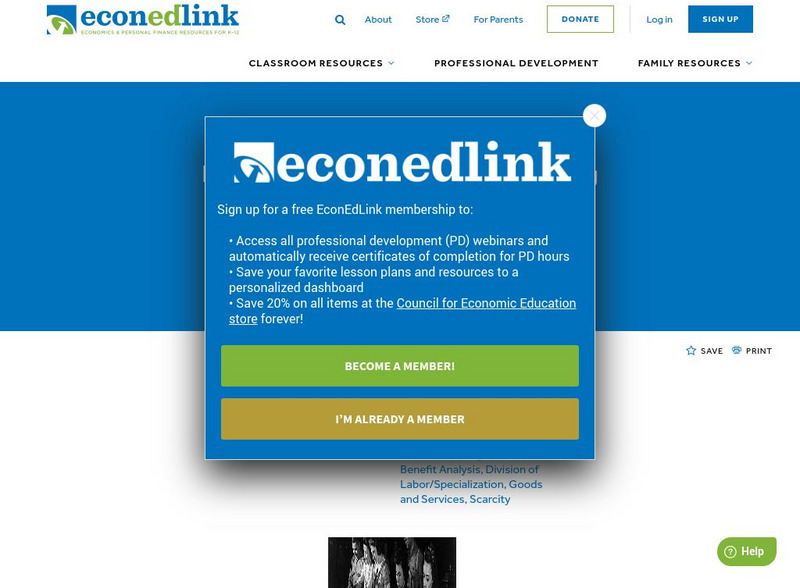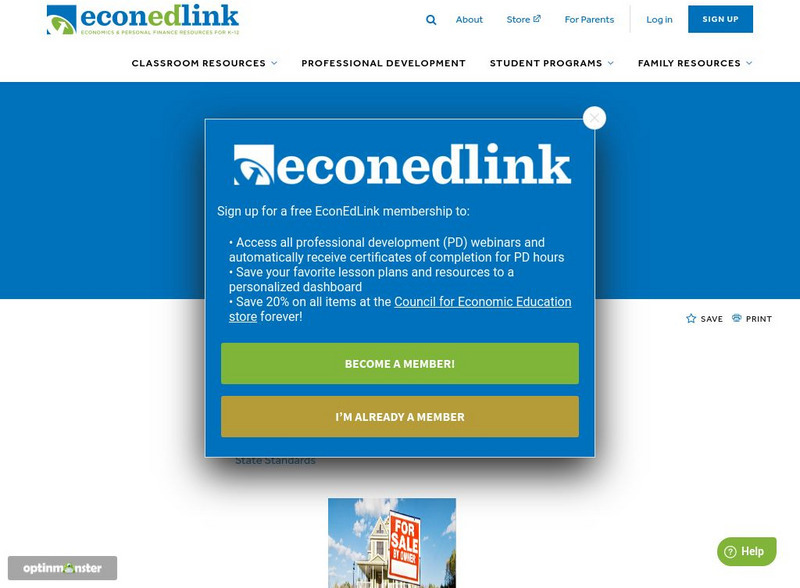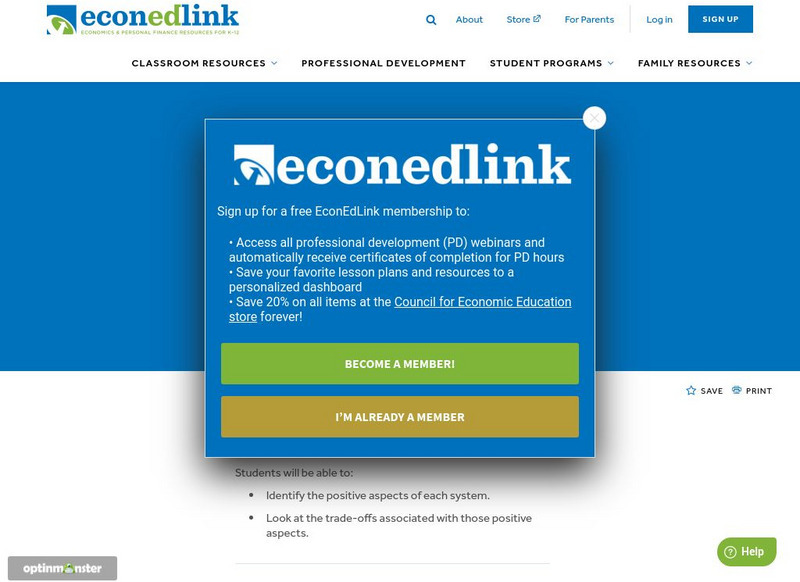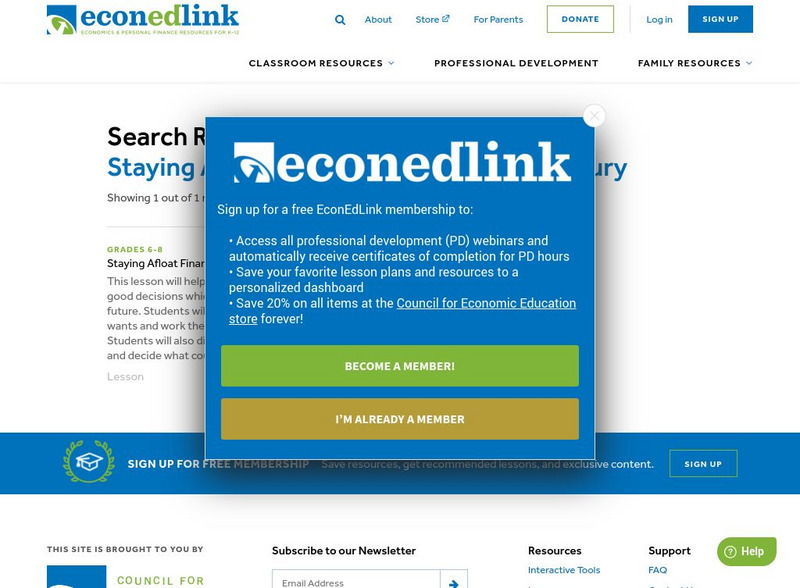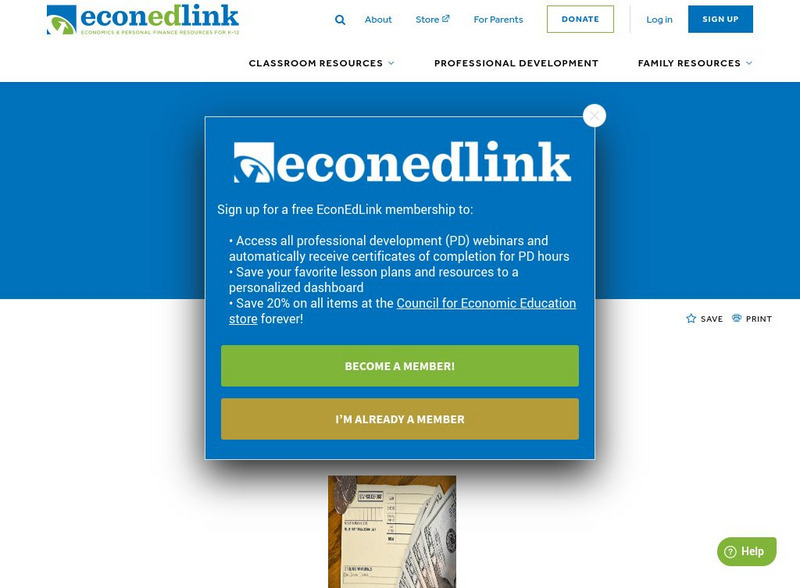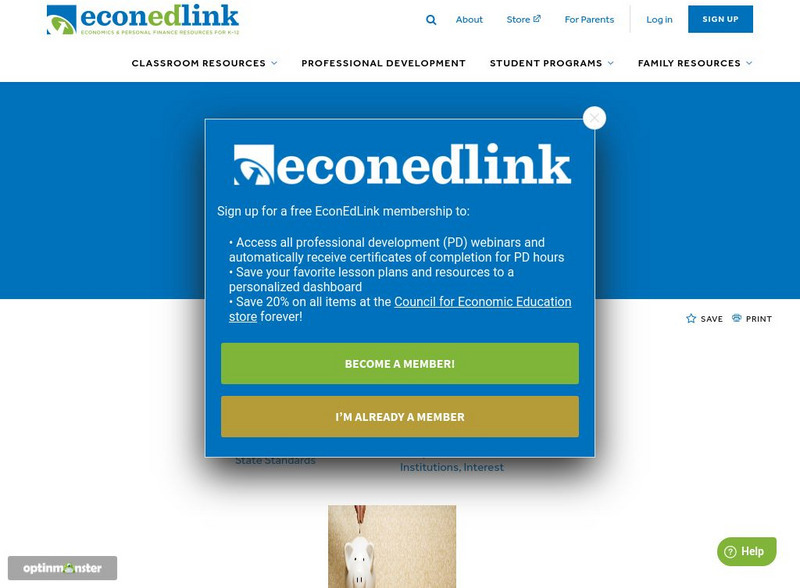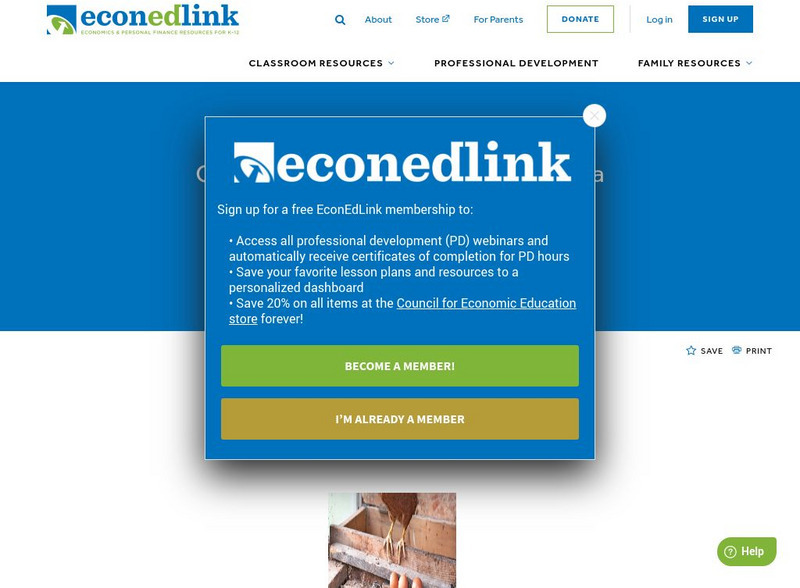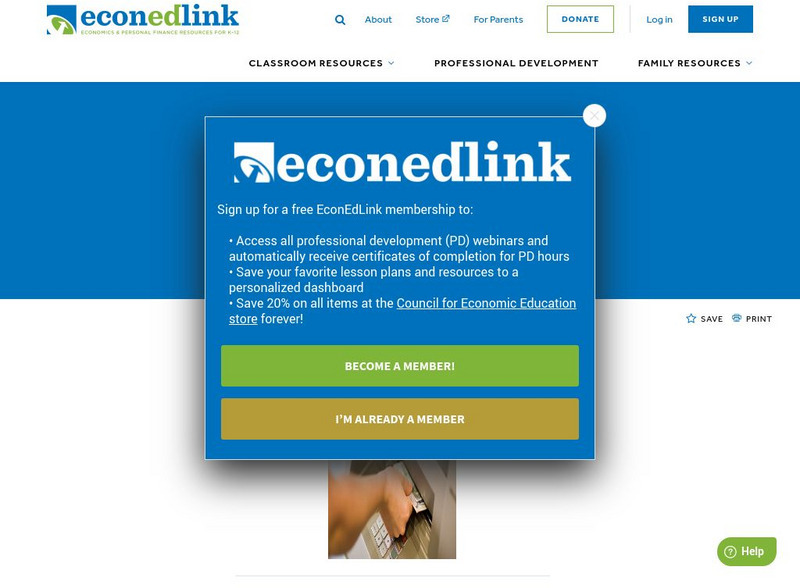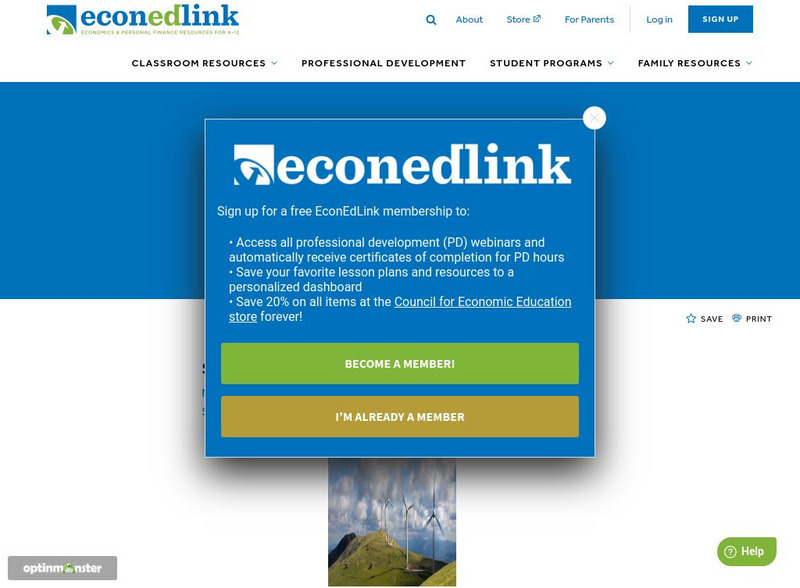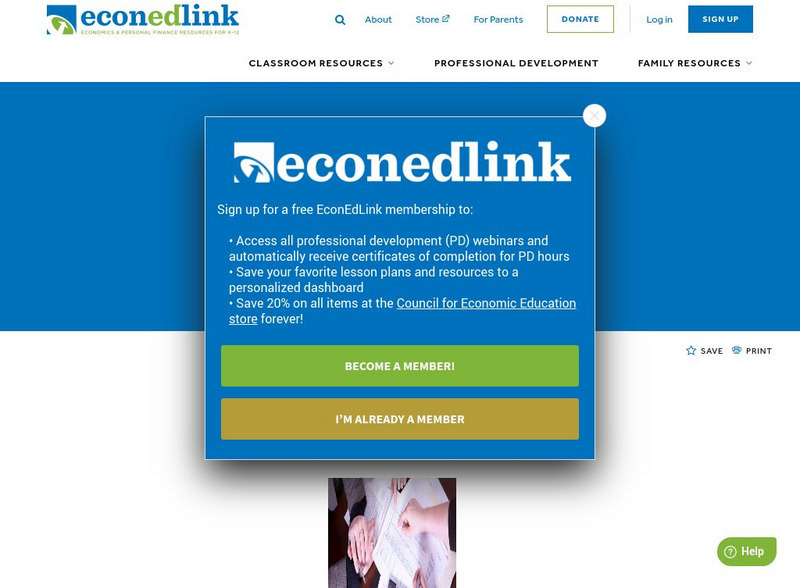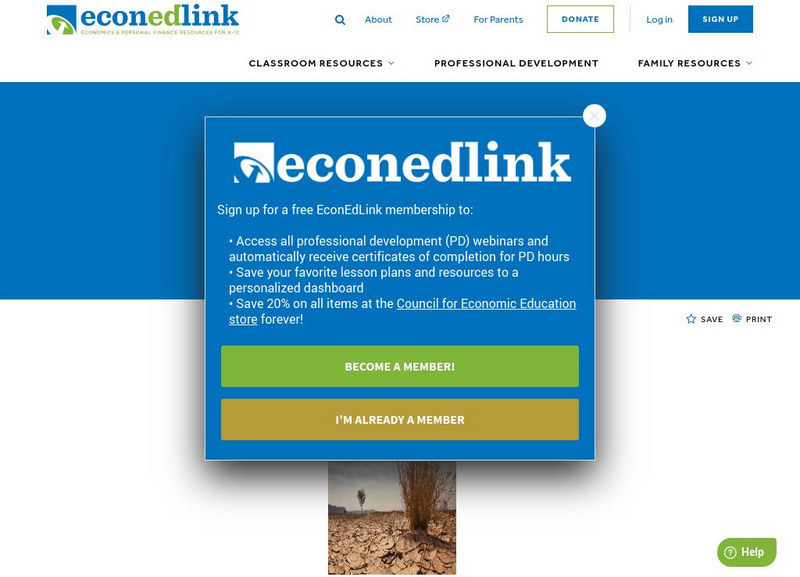Council for Economic Education
Econ Ed Link: Lean on Me We Depend on Each Other
Check out this website to learn more about the economy, specialization, and the reasons assembly lines are used.
Council for Economic Education
Econ Ed Link: Lean on Me We Depend on Each Other!
The purpose of this activity is to demonstrate that the production of most goods can be broken down into a number of specific tasks (division of labor), with each of these tasks assigned to specific workers (specialization.)
Council for Economic Education
Econ Ed Link: Economic Spotter: Resources During World War Ii
In World War II pennies were made of steel and zinc instead of copper and women were working at jobs that men had always been hired to do. Why? Because during war times, scarcity forces many things to change!
Council for Economic Education
Econ Ed Link: Buying vs. Renting
Have you given any thought to where you will live when you are "on your own" - out in the world earning a living? You will have many decisions to make as you look for a place to call home. In this lesson, your basic economic decision...
Council for Economic Education
Econ Ed Link: Car Loan Project
Each student will buy (hypothetically) a car that will need to be financed. The student will need to look at different options and decide which will be the best choice for his situation. The student will need to find an advertisement for...
Council for Economic Education
Econ Ed Link: The Price We Pay for Health: Us and Canada
Students will review the health systems of United States and Canada. They will identify the positive aspects of each system. They will look at the trade-offs associated with those positive aspects. In Canada, everyone has health care,...
Council for Economic Education
Econ Ed Link: Staying Afloat Financially in the 21st Century
This lesson will help young scholars identify how to make good decisions which will help them financially in the future. Students will identify how to take their own wants and work them into a form of a personal budget. Young scholars...
Council for Economic Education
Econ Ed Link: Banks, Bankers, Banking
Students will demonstrate understanding of the processes associated with banking by role-playing as customers, tellers, and guards.
Council for Economic Education
Econ Ed Link: Baseball Economics 201
Some believe our national pastime may be threatened by the big market, high revenue teams like the Yankees (or the New York Mets, Chicago Cubs, Boston Red Sox, etc.) and that smaller market teams (e.g., the Florida Marlins, San Diego...
Council for Economic Education
Econ Ed Link: Big Banks, Piggy Banks
Use this informative economics lesson plan. Find out how to save your money. "You will read about safe places for keeping money; you also will learn about places where money can earn money."
Council for Economic Education
Econ Ed Link: Big Banks, Piggy Banks
When choosing a place to put their money, people consider how safe there money will be, how easy it is to access, and whether it will earn more money. Students explore how well different savings places achieve these objectives. This...
Council for Economic Education
Econ Ed Link: Calculating Simple Interest
How do banks calculate the amount of interest paid on a loan? In this lesson, students will view a Livescribe Pencast to learn how to find the dollar amount in interest that is due at maturity. This lesson uses different time periods...
Council for Economic Education
Econ Ed Link: One Hen: How One Small Loan Made a Big Difference
The picture book One Hen: How One Small Loan Made a Big Difference, written by Kate Smith Milway, takes place in Africa. Here in a Ghanan village, young Kojo cannot afford to go to school after the death of his father. His resourceful...
Council for Economic Education
Econ Ed Link: The Unemployment Game
Students will learn about important labor market statistics that are frequently discussed in the media. An understanding of the unemployment rate and labor force participation rate will be developed through participation in an...
Council for Economic Education
Econ Ed Link: u.s. Farmers and the Cuban Embargo
This instructional activity explores trade barriers in general and why some U.S. farmers want one specific trade barrier, the Cuban embargo, completely eliminated.
Council for Economic Education
Econ Ed Link: You Can Bank on This! (Part 1)
This is the first of four lessons on banking for elementary students. This instructional activity provides the students with information on banking; it also allows them to try out some procedures for thinking about money and banking....
Council for Economic Education
Econ Ed Link: You Can Bank on This! (Part 2)
As in the first ', You Can BANK on This, you will learn that banking should not be confusing - it should be INTERESTING! Lesson Two will continue learning with Zing, but this time we will learn all about budgeting - and budgeting means...
Council for Economic Education
Econ Ed Link: You Can Bank on This! (Part 4)
This lesson deals with credit, and wraps up this unit on finance.
Council for Economic Education
Econ Ed Link: Banking Is Interest Ing!
Banks are important to Americans. We use banks to save money and earn interest, or borrow money and pay interest. This activity introduces the concepts of banking to children.
Council for Economic Education
Econ Ed Link: Blowing in the Wind
Wind energy is becoming a viable alternative to more traditional forms of energy generation. In this lesson, students will determine the feasibility of wind generation in different areas of the United States. Finally, students will...
Council for Economic Education
Econ Ed Link: Capital Investments: Human v. Physical
In this lesson you will define human capital and understand why it is necessary for economic growth. Also, you will explore how people can increase their personal level of human capital.
Council for Economic Education
Econ Ed Link: Credit for Beginners
This lesson focuses on teaching students the basics about credit. It explains why credit is important, how to keep good credit and several of the terms that are associated with credit.
Council for Economic Education
Econ Ed Link: Developing a Financial Investment Portfolio
Students are given brief descriptions of three individuals. They act as financial advisors and develop a financial investment portfolio for each client using internet references as they analyze various saving options. The internet web...
Council for Economic Education
Econ Ed Link: Dry as a Bone
This activity examines the current state of drought in the United States and the economic impact of drought on local communities.




